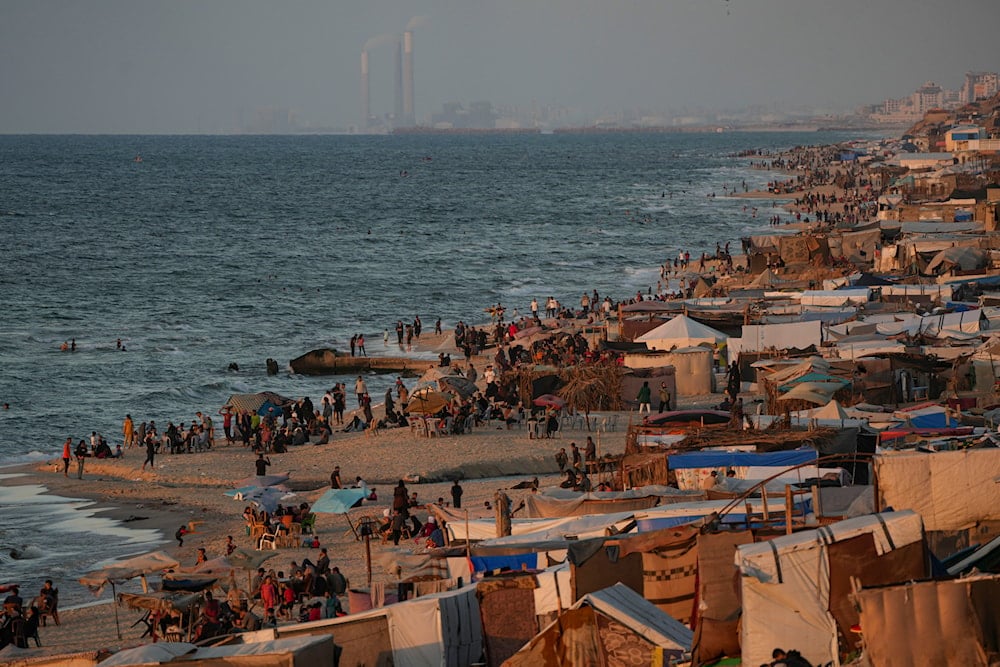Arab states realize Trump’s Gaza stance is serious: WSJ
Egypt takes the lead in seeking an alternative to Trump’s plan, fearing regional instability.
-

Tents are crammed together in a displaced Palestinian camp along the beach of Deir al-Balah, central Gaza Strip, on October 9, 2024. (AP)
A new piece in The Wall Street Journal sheds light on how Arab states that once viewed financial aid as leverage for Palestinian statehood are now scrambling to prevent the forced displacement of Gazans, fearing instability in any nation pressured to accept them.
Egypt has launched an intensive diplomatic push to rally support for an Arab-led initiative to rebuild the Gaza Strip, prioritizing practical solutions over political concerns in an effort to counter a widely unpopular plan from US President Donald Trump.
Trump’s proposal—to have the US "take control of Gaza, redevelop it as an international destination, and relocate its Palestinian residents"—has upended regional dynamics surrounding the 16-month Israeli war on the Strip.
Dive deeper
For Egypt, the stakes are especially high, according to the piece. Trump has repeatedly suggested sending Gazans to Egypt, despite Cairo’s firm opposition. When asked where Palestinians would go, Trump responded, "I believe we’ll have a parcel of land in Egypt."
Egypt’s proposal, The Wall Street Journal reported, citing sources familiar with the matter, aims to keep Palestinians in Gaza and establish a technocratic administration drawn from within the enclave. Security would be provided by Palestinians trained by Arab forces. Cairo is also seeking funding commitments from regional partners and plans to host a donor conference.
The reconstruction process, expected to take up to five years, would be implemented in stages—starting with restoring essential services and providing emergency shelter.
However, key questions remain, as per the piece, "How can Hamas be removed from authority or prevented from sabotaging efforts? Who will join the security forces, and will they be capable of handling any remaining militants? Is there enough funding for a long-term reconstruction project, and who will provide it? Will the ceasefire hold?"
The last question is crucial for securing funding from Gulf states, which are wary of their investments being lost to renewed war, WSJ added.
The Arab alternative
H.A. Hellyer, a Middle East security expert at the Royal United Services Institute said as quoted by WSJ that "for the Arab world, recognizing that Trump actually means what he says in terms of Gaza means the necessity of coming up with an alternative to push forward."
"The issue of Palestinian statehood remains", he noted, but "it won’t be a precondition for beginning reconstruction."
To ease mounting pressure to accept forcibly displaced Palestinians, some Arab states have agreed to take in people on humanitarian grounds. Jordan’s King Abdullah II, after meeting with Trump, announced his country would accept 2,000 injured children from Gaza. Egypt has also taken in wounded Palestinians, and discussions are ongoing to allow students from Gaza to resume their studies abroad.
Trump has invited Egyptian President Abdel Fattah el-Sisi to the White House, but Egyptian officials say no visit has been scheduled. El-Sisi remains cautious about the optics of meeting Trump amid heightened tensions over the Gaza issue.
Egypt will host a summit of Arab leaders on February 27 to discuss what it called "new and dangerous developments in the Palestinian issue."
"There’s a good opportunity for Arab states to come in with their own proposals," said David Schenker, a former senior State Department official for the Middle East. "The question for Abdullah, for Sisi, for the U.A.E., for Saudi Arabia, for all interested states, is to come up with a coordinated position about what they will do in Gaza."
Trump still committed
Trump’s plan has been widely criticized as unrealistic, particularly due to fears of permanent Palestinian displacement. Some have raised concerns over whether it violates international law, with potential implications of ethnic cleansing.
Israeli Prime Minister Benjamin Netanyahu has embraced Trump’s proposal as "fresh thinking," and the Israeli security minister has instructed the military to draft contingency plans for "relocating Palestinians." However, some captive families fear the plan is complicating ceasefire talks aimed at securing their relatives’ release.
One potential side effect of Trump’s proposal, some officials argue, is that it may spur Arab states into action, as per the piece.
"The blunt truth is that the Middle East has for too long been a region of places all of whom love to talk but don’t want to do," said U.S. Secretary of State Marco Rubio. "If they don’t like Donald Trump’s plan, then it’s time for these countries in the region to step forward and offer their solution."
Trump, meanwhile, remains committed to his vision. "We’re going to take it, we’re going to hold it, we’re going to cherish it," he said during his meeting with King Abdullah.
The former president reiterated his vision of "transforming Gaza into a luxury coastal destination", with hotels and housing for visitors from across the Middle East.
Caught in a delicate diplomatic position, Abdullah suggested Arab leaders would present their own postwar Gaza plan later this month. "Let’s wait until the Egyptians" put forth their proposal, he said.

 5 Min Read
5 Min Read









